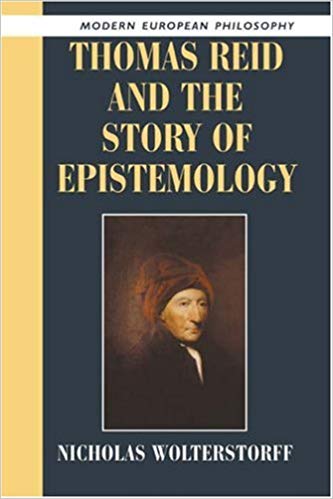The Resurgence of Thomas Reid and "Common Sense" (Part Six)
 Wednesday, August 22, 2018 at 01:12PM
Wednesday, August 22, 2018 at 01:12PM The Decline of Scottish Common Sense Realism
Reid’s On-Going Influence and Resurgence
 Reid and SCSR may have been relegated to the philosophical backwater by Kant’s Critique, but Reid’s influence never entirely abated, especially in America, where Reid was widely read and greatly appreciated. Thomas Jefferson was glowing in his praise for Dugald Stewart, the Scottish philosopher who did much to popularize Reid and SCSR throughout the English-speaking world. Several early United States Supreme Court cases make appeal to the “eminent Dr. Reid” when wrestling with the nature of facts and their interpretation. Scottish-American philosopher and president of Princeton College, James McCosh (1811-1894) and Yale professor and president Noah Porter (1811-1892) maintained strong interest in Reid and SCSR since both were concerned about the “objectivity of truth,” especially in matters of moral philosophy.
Reid and SCSR may have been relegated to the philosophical backwater by Kant’s Critique, but Reid’s influence never entirely abated, especially in America, where Reid was widely read and greatly appreciated. Thomas Jefferson was glowing in his praise for Dugald Stewart, the Scottish philosopher who did much to popularize Reid and SCSR throughout the English-speaking world. Several early United States Supreme Court cases make appeal to the “eminent Dr. Reid” when wrestling with the nature of facts and their interpretation. Scottish-American philosopher and president of Princeton College, James McCosh (1811-1894) and Yale professor and president Noah Porter (1811-1892) maintained strong interest in Reid and SCSR since both were concerned about the “objectivity of truth,” especially in matters of moral philosophy.
Since Kant’s and Hegel’s philosophical systems never became mainstream in America (with several notable exceptions such as Josiah Royce), it was the uniquely American school of philosophy, Pragmatism, which ultimately displaced Reid’s SCSR in America. Charles Sanders Pierce (1839-1914), the father of American pragmatism, agreed with Reid to a point, and argued that a universal common sense (as expressed by Reid) was worth recovering as a philosophical category, although Pierce thought common sense should be tied to experimental verification and the scientific method in the evolutionary sense of unfolding truth, and not grounded in first principles.
Following Pierce, the emerging pragmatists understood that outcomes in philosophy and the sciences were directly tied to verifiable consequences, most notably experiential “cash value.” William James (1842-1910), perhaps America’s most notable pragmatist, gave a well-received lecture on “Pragmatism and Common Sense” (James, Pragmatism, 63-75). James argued that common sense was compatible with pragmatism because James believed that without any prior self-reflection on such matters people naturally tended to gravitate toward ideas and systems of thought which produced concrete results. Since pragmatism is grounded in outcomes, there was little interest in anything like Reid’s first principles among the pragmatists. Pragmatism may make appeal to “common sense,” but such an appeal is actually a negation of common sense as understood by Reid. Yet, it was an easy intellectual move for Americans to give up SCSR for pragmatism, the nouveau cutting edge philosophy of the day.
Reid’s common sense was popularized on the Continent by French philosopher Victor Cousin (1792-1867) and was begrudgingly praised by Henry Sidgwick (1838-1900), a moral philosopher in the utilitarian tradition and the Knightbridge Professor of Philosophy at the University of Cambridge. G. E. Moore (1873-1958) one of the founders of the analytic tradition, cites Reid throughout his works. Reid’s work also had a significant influence upon American philosopher Roderick Chisholm (1916-1999) who trained a number of leading American philosophers, and who acknowledged that his own defense of common sense was indebted to Reid. More than one philosopher (i.e., Lehrer, Wolterstorff) has noted that in Ludwig Wittgenstein’s On Certainty, Wittgenstein is addressing what he calls “our shared world picture” in a manner strikingly similar to Reid’s “common sense” but without making appeal to our nature (first principles).
Perhaps those who have done the most to rescue Reid from the irrelevance of the philosophical backwater, are the so-called “Reformed Epistemologists,” Alvin Plantinga and Nicholas Wolterstorff. Along with philosopher William Alston, they done much to rekindle current interest in Reid and SCSR, especially within the broader Reformed tradition. Reformed epistemologists contend that belief in God is “properly basic.” That is, it is rational to believe in God without any evidence or proof for doing so. According to Plantinga, religious belief is grounded in what John Calvin identified as an innate human awareness of God’s existence (the so-called sensus divinitatis).
Looking for philosophical antecedents, Reformed Epistemologists make appeal to Reid’s notion that beliefs arise in us spontaneously because we are born with them. These basic beliefs function like “common sense”–people believe in God without any prior reflection–but such simple belief can be further cultivated through instruction and maturation through the experiences of life. We may not be able to give a reason for God’s existence, and any reasons we might offer to prove God’s existence, presuppose the very capability of reasoning with which we have been created by God. For the Reformed Epistemologist, belief in God as properly basic functions as a first principle. Such belief is rational (and therefore “warranted”) every bit as much as are our belief in the existence of other minds, or our memory of past events.


Reader Comments